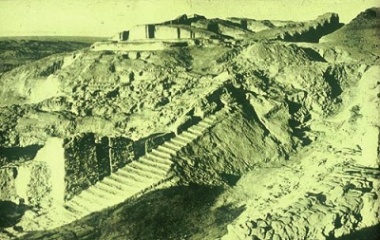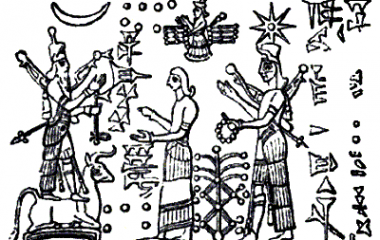- Pronunciation: uhn-noo
- Origin: Sumer, Mesopotamia
- Role: Sky god
- Symbols: Horned Cap
- Parents: Ansar and Kisar
- Children: Enki, Ningikuga, Ninsuna
Who Is Anu?
The Sumerian god of the sky and head deity and ruler of the highest realm, Anu was the child of Ansar and Kisar, the very first set of gods and descendants of primordial beings. Anu was known as the father of the 50 great gods, and ruler of the stars and the spirits. Anu, Enlil and Enki were the trinity that ruled over the heavens, the earth and the seas. Anu is sometimes referred to as “An”. “An” translates from the Sumerian language as “high one” and the name Anu eventually became synonymous with “god”.
Origin
Sumer was the southern region of ancient Mesopotamia, considered the cradle of civilization. Today, the area forms part of the countries of Iraq and Kuwait. Sumer means “land of the civilized kings” in Akkadian, the language of northern Mesopotamia. When the gods initially gave humans the gifts required for cultivating a society, the first city of Eridu was created in the region of Sumer. It was here that order and civilization originated.
Records of Anu date back to at least 3,000 B.C., making him one of the oldest of the gods. Originally known as “An”, he was later called Anu by the Akkadians who were the rulers of Mesopotamia after their conquest of Sumer. In the stories of Mesopotamian mythology, the earth was separated from heaven at the beginning of time.
Family of Anu
The parents of Anu are Ansar and Kisar, the first gods who were created by the primordial beings Apsu and Tiamat.
Anu is also known as the Great Bull, as he had several female companions. The first was Ki, goddess of the earth. Anu and Ki were identified as brother and sister in some ancient literature. With Ki, Anu had 50 princely offspring, also known as the “great gods” and the Annuna. Later on, with Nammu the goddess of the sea, Anu fathered Enki (patron god of the first city of Eridu) and Ningikuga (goddess of marshes). By Uras, earth goddess, Anu fathered Ninsuna, the legendary mother of Gilgamesh.
Epic of Gilgamesh
The Epic of Gilgamesh is the 3,200-year-old account of the protagonist’s exploits and is the most famous tales associated with Anu. As one of the oldest surviving works of literature in the world, its discovery is considered one of the most sensational finds in the history of archaeology.
Gilgamesh, one-third human and two-thirds god, son of Ninsuna and grandson of Anu, was the king of Urak. He was handsome, strong and wise. Despite the fact that he was godlike, he wasn’t kind to his subjects. He had walls around the city and magnificent temples built with forced labor. He raped any woman in the kingdom that he desired. His subjects were tired of suffering, and called out to the gods for assistance. They sent a man named Enkidu to keep him in check. Enkidu was a magnificent man, and the two became great friends. Eventually, Enkidu died of an illness brought upon by the wrath by the gods. Gilgamesh was heartbroken, and began his travels to the edges of the world to learn the secrets of the gods.
In the earliest part of the epic, Enkidu lives with animals in the wild. One day, a hunter comes across him as he is sharing drinking water from a ground well with the animals. The hunter runs home to his father to tell him about the man who lives with animals in the wild. They decide to bring a prostitute to him, thinking that sex might calm him down, and that being with a woman could cure him of his unconventional habits. After the interlude, which lasted for seven whole days, the animals rejected him. Distraught and alone, Gilgamesh goes back to the prostitute for comfort. She tells him that humans have a good life and he would likely enjoy being in the city of Uruk.
Once Enkidu hears about the excesses of Gilgamesh, he sets out to the city to confront the king. Upon his arrival, he finds Gilgamesh about to enter the chamber of a bride to rape her. He blocks the entry, and the two wrestle it out. Gilgamesh wins and the two become fast friends.
The men begin an adventure together and travel to the forest to steal cedar trees that are guarded by a demon. They kill the monster and build a raft with the wood from the trees. They use their raft to travel home to Uruk. Upon their arrival, they meet the love goddess Ishtar, the daughter of Anu. She expresses her lust and desire for Gilgamesh but he rejects her advances with disdain. The furious goddess appeals to her father, requesting he send the Bull of Heaven as retribution. Along with the bull comes a famine that lasts for seven years. Eventually the two friends hunt the bull down and murder him. Subsequently, a council of the gods is convened. It is decided that at least one of the men should be penalized for their behavior. Enkidu gets a fatal illness and endures terrible suffering before he finally dies, leaving Gilgamesh heartbroken over the loss of his friend.
He heads into the wild to seek out Utnapishtim, so he can find out how to avoid the fate of his friend and prevent his own death. Utnapishtim is the Mesopotamian version of Noah. After the big flood, the gods gave him eternal life, and Gilgamesh wants to know the secret.
Following much adventure, he finally finds Utnapishtim, who tells him the myth of the great flood. The council of gods had devised a plan for the destruction of mortal beings. Utnapishtim was given a warning about the plan by the god of wisdom, so he built a huge boat to carry the seeds of all living creatures. When the flood ended, the gods felt remorse and regret. They vowed that they would not try to destroy people ever again. Utnapishtim was rewarded with immortality. Men and women would still die, but the human species would always go on.
Insistent on living forever himself, Gilgamesh is tested to see if he is worthy of eternal life. It is suggested he start with staying awake for one week. He quickly fails, and is ordered by Utnapishtim to put his royal robes on and head back to Uruk. Upon his departure, Utnapishtim’s wife tells him about an amazing plant that can restore youth. He finds the plant and plans to take it with him, but a snake snatches it one night while he is sleeping. As it slithers away, the snake molts its old skin and becomes young again.
Gilgamesh has nothing to present to the elders of Uruk upon his return, but is at last reconciled with the idea that he will not have an eternal existence. He will not live forever, but mankind will go on. As he approaches the great city he built, he realizes his great achievement. Although he will not live forever, he will be remembered. His fine city will be his legacy.
Historic Influence
The Sumerian religion encompassed the mythology and beliefs of the ancient civilization, including the life of Anu. Since they were the first to have written language, their myths were recorded on tablets, upon which Anu features heavily, and which influenced later religions and cultures. As the father of the gods, Anu holds a key role in the mythology and its effect on literature and beliefs that followed.
The similarities between the flood in Genesis and the Sumerian flood myth are a clear example of the possibility of the influence of the Sumerian religion and the tales of Anu and Gilgamesh on the Hebrew Bible, or Christian Old Testament. It’s an easy extension to realize the possibility that Anu and the other deities yielding power over the world and its people have evolved into the similar beliefs in current world religions.
The Epic of Gilgamesh is classic literature which has been translated into numerous languages and studied worldwide. Even though it is one of the oldest recorded stories in existence, and our modern world is very different than the world of ancient Mesopotamia, the epic myth remains timeless. It encapsulates the essence of the human experience.










